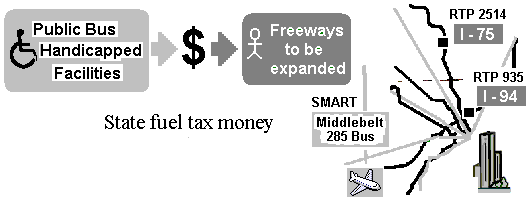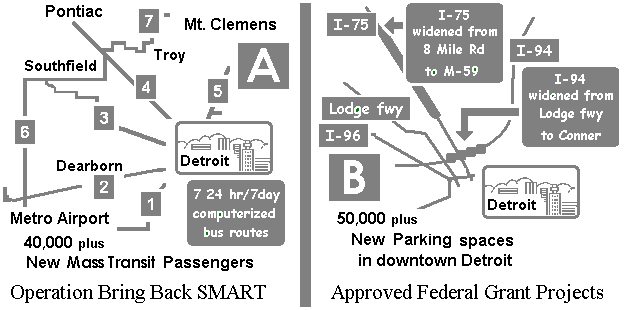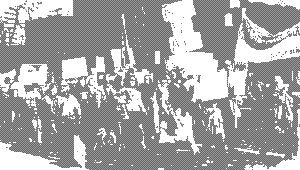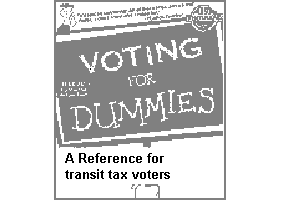|
BACK TO... Homepage --- Be an Informed Voter Legislators in Michigan are looking for new money to help build, operate, and maintain the transportation system. But instead of raising fuel taxes, introducing new forms of fees or encouraging competition and more efficient use of our transportation system, they are forcing local governments to raise nonuser funds locally. Click Here --- Alternatives to Regional and Local Transit Tax Increases |
|
The morality of protecting existing tax funds for transit back to top
Discrimination - The replacement of state fuel taxes is an unethical practice in handling public funds because these funds provide essential transportation needs to many who are unable to provide for themselves. Federal laws defines that alternatives must be provided of which they are not at this time. The increase of taxes other then state gasoline/diesel fuels to support "community transit" for the transit dependant and the disabled neglects the importance of priority as how to use our transportation tax dollars as a region defined as the "State of Michigan". The I-75 freeway when viewed in its entirety, is not readily accessible to handicapped persons thus does not conform to TITLE 45 The alternate facility of Woodward Ave and related travel options were "broken up" and/or eliminated as a result of the neglect to keep in an existing state an equal balance of funds. The MDOT I-94 Rehabilitation Project in Detroit is a freeway expansion along an axial line with existing alternate public bus routes known as Michigan and Gratiot Aves. This relationship is something which can be chosen instead as a "freedom of choice" thus this project is a privilege demanding fulfillment of a contract. The agreements under Act 51 247.660b - comprehensive transportation fund are not utilized under the state constitution for transit to promote a free-market economy of abundance and prosperity. The coherence and connections of surrounding areas are not only neglected but destroyed by not using the current space and resources efficiently and competently. There are no provisions for users to pay a decent amount for any basic needs of those unable to drive, the disabled or for communities to thrive. The allocated budgets do not include working street lights, wheelchair lifts, park and rides, computers, time-tables to coordinate all modes of travel, shelters, buildings and other essentials. The design is simple and barren. This project is not accessible, except for those who can afford to pay the costs of this freeway without mass transit leadership, the large trash importers and a few others. This Billion dollar project is unworthy of taxpayer's money and does not meet TITLE 45 requirements at this time. Devolution - The transference of rights to surrender property and responsibility to another; especially : of powers to local authorities by a central government. In the case below, the Michigan Department of Transportation (MDOT) to individual counties, cities and townships. The freeways and projects in illustration below are not in full compliance with the AMERICANS WITH DISABILITIES ACT - ADA of 1990 TITLE II--PUBLIC SERVICES. Also, civil rights. The fundamental issue of securing permanent funds for transit while reducing the cost of driving with more road space is a devolution in conjunction with the competent use of tax dollars to attract more riders as essential to lower per passenger costs. Mass transit came first to downtown Detroit, then the freeways followed.
"State Fuel Taxes" verses "Community Transit" Community Transit is an alternative to the private vehicle to meet specific needs of individuals and neighborhoods. These needs include connecting the poor and unemployed with jobs and training facilities, offering the elderly access to needed services and mobility for people with disabilities. The proposed tax reforms to correct the disputed funding deficiencies of both community and existing transit do not include expanding fuel taxes and user fees or collecting any tax/fees for new facilities defined as I-75 and I-94. The corresponding alternate handicapped facilities defined respectively as public bus facilities along the routes of Woodward, Fort, Michigan and Gratiot and related routes are deprived according to ADA regulations with regard to both ability to pay and services rendered. The result is a lowering of effective power, vitality and essential quality to an enfeebled and worsened state and a degenerate condition of physical characteristics from a level representing the norm of earlier generations. The enhancement and protection of current tax policies and/or increased efficiencies can resolve these issues of impairment. Adverse possession - One of the most important rights is being able to own property. The state fuel tax does provides sufficient funds for the disabled should the public defend it as an "operating expense" and a means to raise and acquire capital. The M-53 freeway expansion and others should not be built with state taxes unless compensation from those who benefit is first acquired. This expansion increased property values north of Macomb County by increasing taxes in the city of Detroit to adjust for inflation which obstructed settlement*(1) thus did not properly meet TITLE 43. The I-75 freeway expansion in the 25 year Transportation Improvement Plan (SEMCOG 2030 TIP) does not meet TITLE 43 because compensation has not been sought by securing "non-user" taxes where applicable and "user" taxes from fuels and tolls or contributions and private investments to raise capital. The shift of costs away from freeway drivers to other taxes for associated and related transportation has resulted in a loss of jobs in inner city Detroit.*(2) TITLE 43 was corrected before this plan was adopted with the settlement of property taxes which resulted in dis-jointed bus service along Woodward Ave making the corresponding I-75 freeway fail to conform with minimum requirements to obtain federal transit grants. The United States uses more foreign oil then any country in the world and "regional transit taxes" are making this dependence even worse as per-passenger costs are rising faster than wages.*(3) This has not fully happened in Michigan yet, but can should the public vote for higher taxes without regard to competence, wages and cost controls. The alternate Woodward handicapped faciilites are treated as unworthy of regard with no attention. This can only be properly corrected from increasing farebox revenues from employment and from the Michigan Transportation Fund (state fuel).*(4) The public has a clear choice to vote "NO"on transit tax increases, if this fund is depleted and/or reduced for public bus services as defined throughout this website. |
|
The economics of using State fuel taxes for transit back to top The PDF documents at the bottom of this page show that new transit tax mechanisms and increases which include regional sales do not result in cost-effective mass transit. In Michigan, proposed policy changes can result in more jobs leaving our state and the loss of revenue sharing for essential government services including education without written accords.The freeway projects costs in drawing below are documented here. The solution presented on side A was proven to work. The rider-ship in the western Detroit suburb of Livonia was increased as a result. and is evidence that the public should support this plan.
The I-94 and I-75 freeway expansion projects (as shown in B above) will worsen traffic congestion into downtown Detroit. This is because MDOT will not provide mass transit alternatives (as shown in A above) by taxing the cost of driving to favor those who use mass transit and to remove cars from congested freeways during rush hours. Proponents of Regional/Local transit tax increases want to use money from the Michigan Transportation Fund (State fuel tax) to add High Occupancy Vehicle (HOV) lanes on I-75 at the cost of $530 Million dollars and expand other freeways and roads instead of paying for frequent bus service where practical. |
|
The protection of transit funds must be made public back to top
Statistics show increasing state CTF funds for mass transit along with increased efficiencies is most effective to attract business, enforce federal disability policies and protect our environment. These funds are about $90 Million per year for SMART and DDOT (as of 01/05). The claims by transit tax advocates that these funds are not enough to support "community transit" for the transit disabled is counter-productive and discrimination unless minimum federal and industry standards can be met. The viewpoint of "There is no correlation between driving and using mass transit" is false, thus a two-tiered approach to utilize fuel and property taxes/fees to support dedicated operating budgets is proposed in these WebPage's. It is a constitutional right in the United States to force the "issues" of state fuel taxes and our industries by means of competition and decent wages to help pay for "transit operating subsidies". State fuel taxes are not a requirement to receive federal transit grants or support mass transit. But, statistics from the Citizens Research Council of Michigan and the Brookings Institute shows fuel taxes are effective to obtain and promote responsible use of federal transit funds. The Suburban Authority for Regional Transportation (SMART) property tax for many communities in Wayne and Oakland and all of Macomb county. State CTF funds are requested by Save the Fuel Tax to distribute frequent bus service where practical to restore the unity of the transportation system. (see option 13, under Alternatives to Regional and Local Transit Tax Increases)
~ return |
|
Right to know -
back to
top Detroit Area Regional Transportation Authority - DARTA
Marketed as a milestone in the efforts to improve mass transit in southeast Michigan. Proponents in power claim new service drives along I–94 in downtown Detroit and 18 miles of new High Occupancy Vehicle (HOV) freeway lanes on I–75 in Oakland County can actually improve bus service. There would be less opposition for these freeway projects if the money was there to build them and keep good bus service, but this has not been the case in the past. This is a primary reason prominent transit advocacy groups, the Michigan Land Institute and others protest freeway and road plans. The public has the right to know Act-267 of 1976 to fully protect mass transit's share of state fuel tax money to pay for " operating" and other associated costs. According to ACT-51,247.660b-Subpart(b), the state is not required to pay more then what is collected directly by local governments. In December 2003, the DARTA was introduced to federal requirements for the use of the state fuel tax from the Michigan Department of Transportation as an existing need. The seeking of a chief executive officer without dedicated operating funds means money must be secured, but from " where?" |
|
At the voting booth... back to top
--- If increased funds from the Michigan Department of Transportation (MDOT) are not in writing at the voting booth, then they do not exist. Conditions to make the freeway expansion projects accessible to all and save SMART include ---
|
|
How mass transit is funded in Michigan back to top
Beware of transit tax increases to cure a crisis that doesn't exist
We can pay for public transit with present
funding. The question is "do we want to?" or do
we want to support other tax mechanisms and new
policies? Watch out for snake oil claims to cure
traffic congestion and to help the poor. They go
by the names of state transit grants, regional
cooperation and many other such comforting names.
What they really do is give a false sense of
security at the cost of economic freedom and
competition. There are no magic tax elixirs thus
the best solutions are hard work and the
protection of existing funds. |
|
Transit Advocacy Groups back to top An optimum balance of funds from fuel taxes, fares, tolls, commerce and many revenue sources for transit is the proven solution. The best source is wages from those who pay at the farebox and monthly passes. In 2003, transit rider ship increased as a result of citizen actions and wages and not the mass transit leadership our state should have.
|
|
References and publications back to top
|







